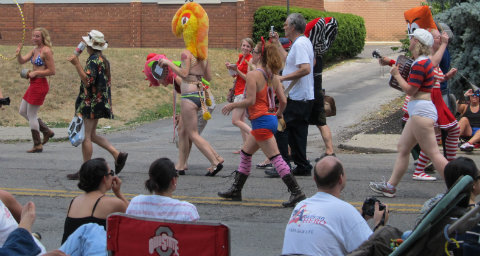 In order to be a better writer, you have to be psychotic. I have reached this conclusion after spending the last six months rapidly absorbing and deploying an entire arsenal of writing tips and techniques. In an effort to do better at my day job I embraced feedback, read blogs, studied books and assimilated anything and everything I came across on being a better writer, and it amounts to a rather terrifying prospect.
In order to be a better writer, you have to be psychotic. I have reached this conclusion after spending the last six months rapidly absorbing and deploying an entire arsenal of writing tips and techniques. In an effort to do better at my day job I embraced feedback, read blogs, studied books and assimilated anything and everything I came across on being a better writer, and it amounts to a rather terrifying prospect.
When I say psychotic, I do not mean a genuine mental illness (at least I don't think I do). I'm not saying you have to be mad to want to write, nor am I making any claims about delving into Freudian analysis or seeing the world through the mind's eye. I am talking about practical tips for producing better copy and developing a stronger voice, which amount to splitting yourself into several personas, and severing each from the other.
In The Art of Nonfiction, Ayn Rand says that whilst you need to use the conscious mind for planning and editing, for writing you need the subconscious to be in control. Now, whilst her politics elicit quite a bit of controversy (I read her book for writing tips only) her guidance for writers seems less disputed. "I have learned to give writing tasks to my subconscious - which may, in turn, pass the assignment on to my unconscious," says Donald Murray in Writing to Deadline.
Not only do these writers advocate creating barriers and walls between different versions of yourself for different activities, but they also speak about them self-referentially, suggesting an additional meta self. That's kind of weird right?
At the most basic level you have to have a writing self, who turns off inner criticisms and suppresses the desire to correct in order to get words on the page. You then have to sleep on it and wake up as an editor: someone who can dispassionately read and rip apart those lovingly created words to (hopefully) make them better.
Crank it up a notch to people who write for a living or who blog and due to deadlines and a writer's ability to leave things to the last minute (like that's exclusive to writers), you find yourself having to make that mental switch without the night's sleep. (That's when the twitching usually starts.)
Blogging in particular seems to elicit some sort of strange multiple existence. Bloggers must be a commissioning editor, writer, editor and proofreader, brand manager, and promoter. For a lot of blogs your identity is also the core of the blog itself:
[Blogging] had a different function from other kinds of writing, in that it wasn’t meant to just be this piece of writing that people read, it was meant to be a piece of writing that started a conversation among the readers. - Nora Ephron.
You can't have a conversation with a website, it has to be with a person. So a blog, and its writing therein, has to be a person. A real, sociable and talkative person. But expressed in written words.
As a writer, and a blogger in particular, you end up splitting up your mind in order to create a cohesive identity. And the oddest thing of all is that it seems to work. I have found myself carving out these different mindsets, or personas, and increasingly distinguishing them from each other, and my writing has improved as a result. Writing has also become easier and I feel more confident about both my writing and my identity.
So to become a better writer you have to fall down the rabbit hole of a very particular, and strangely enjoyable kind of psychosis. Or at least, that's probably what you'll find yourself doing once you've fallen far enough to realise it.